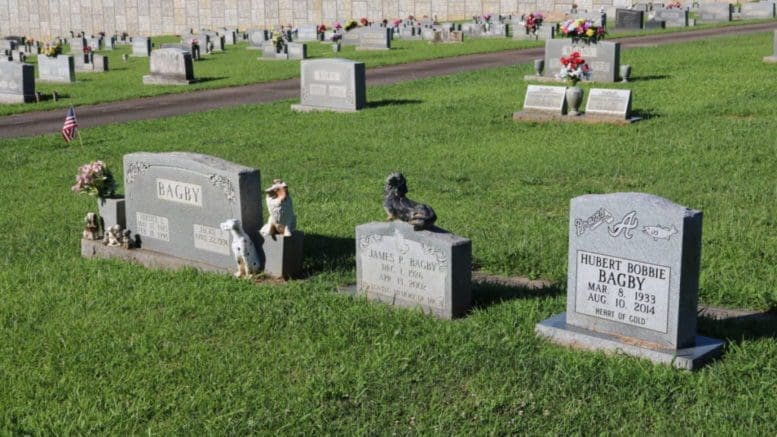[Editor’s note: This is an evergreen article I frequently resurrect and rework as our readership increases, because the Bagby brothers were a fascinating throwback to Depression-era roving bandits, and they operated on the Chattahoochee River near the crossing at South Cobb Drive.]
There is a cluster of Bagby family graves in Riverview Memorial Park cemetery in Cobb County. The cemetery is on the edge of the Chattahoochee River, adjacent to the much older Hooper- McWilliams Cemetery.
The family patriarch, Hunter Bagby, and his wife, sons, and daughters are buried there.
However, the most locally famous member of the family was William Grady Bagby, who was known as “Roosterman.” Bagby was named “Roosting Man” by local police for his habit of “roosting” in trees to avoid capture. Cobb County residents abbreviated “Roosting Man” to “Roosterman.”
Bagby was born in Rome, Georgia, in 1916 to Hunter Berry Bagby and Jennie M. Bagby. At some point before 1940, their large family moved to Chattahoochee, Georgia, a mill town located on Bolton Road. The area is now the Whittier Mill neighborhood.
Roosterman’s father, Hunter, and his then 16-year-old brother, Vertice, worked at Whittier Mill.
Mill life was rough, and being a child of the Great Depression made it even rougher, so Roosterman turned to a life of crime.
He and his younger brother Hubert specialized in burglaries, and both of them became famous among law enforcement for eluding capture.
In those more jurisdiction-sensitive days, Roosterman often camped on the banks of the Chattahoochee River, making escape to either side of the river easy, depending on which police or sheriff’s department chased him. Chases would often end where another jurisdiction began.
His exploits were often reported in Atlanta newspapers, including the following chronicle of arrests and escapes.
By 1940, Roosterman Bagby was already having frequent scrapes with the law. He was convicted and sent to prison for “gaming” in 1941, released, and by 1942, he was back in prison for attempted larceny. Other prison stints over three decades included convictions for burglary, prison escape, abandonment, and possession of moonshine whiskey.
In 1957, Roosterman and his brother Hubert were back in the news again. In July of that year, the older brother escaped from prison in Chatham County, and a few weeks later, Hubert lept from a police car in Riverside, then a separate town now part of the City of Atlanta, and disappeared again.
Hubert Bagby phoned the police a few days later and said he was tired of being a criminal but “couldn’t stand the idea of being cooped up in prison.”
Roosterman was caught again in September when he decided to catch a taxi at a cabstand in Riverside, a small Fulton County town now part of the City of Atlanta. Nearby police recognized him, and he was recaptured.
The younger brother Hubert took to the river again, eluding police until March 1958. He was caught at his mother’s home on Bankhead Highway (now Veterans Memorial Highway) near Nickajack Creek in Cobb County, curled up under his mother’s bed, sleeping.
Both the brothers served time in prison, and in 1968, William Grady “Roosterman” Bagby was killed by his brother Vertice in a fistfight. Roosterman had been living with Vertice.
During an argument, they began fist-fighting in the yard, and Roosterman fell and hit a tree. Vertice called an ambulance, but the older brother was dead by the time they arrived.
In the article about his death, an Atlanta Constitution reporter wrote, “The athletic Bagby could swing through the trees with the agility of a Tarzan. During many brushes with police, he took to the trees or the river in order to escape bloodhounds.”
The article quotes an unnamed old-time policeman, who said, “You let him get two feet away from you in the woods, and you might as well have been looking for a ghost. He’d just naturally vanish into thin air.”
Hubert Bagby died in Carrollton, Georgia, in 2014.
Both brothers are buried near each other and the rest of their family at Riverview Memorial Park.
